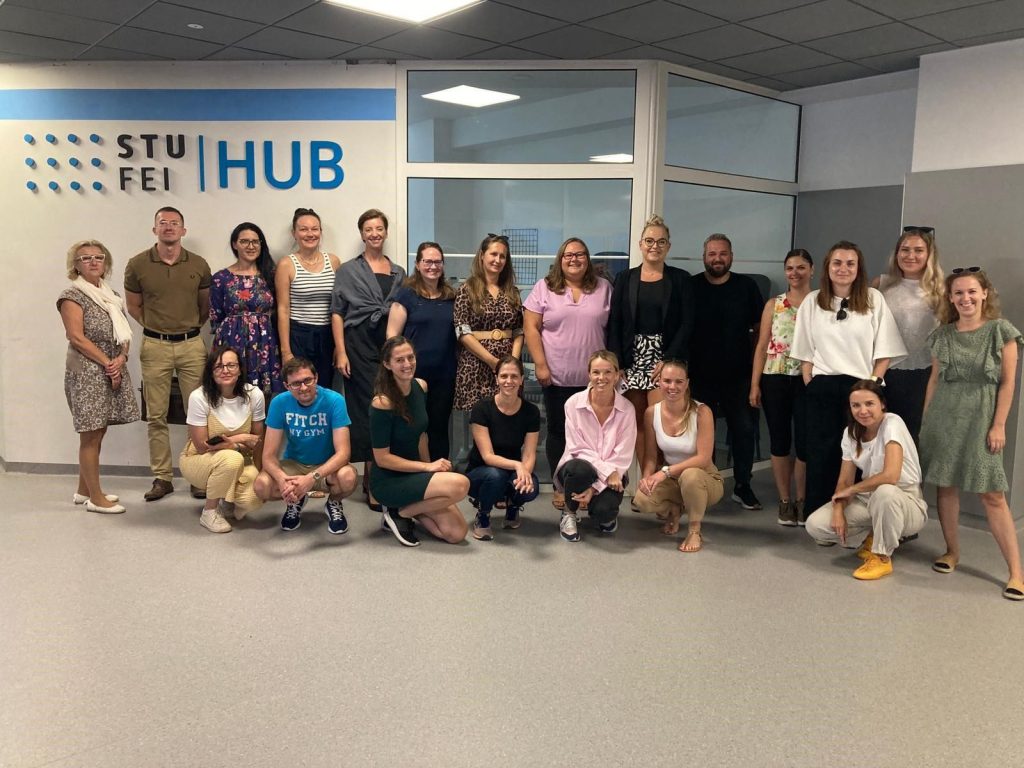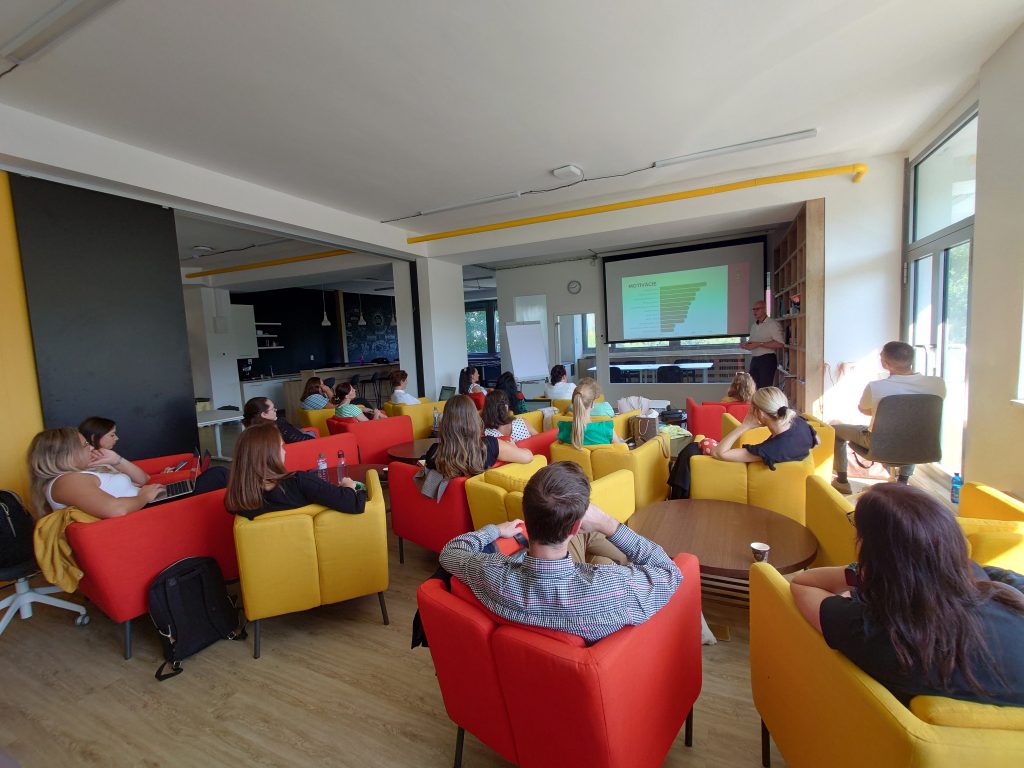

From idea to reality, or what is the story of peer support: the Buddy System
Prepared training documents, conducted training, launched working group. Thanks to this, the Buddy system is one of the fastest growing projects of BEET.
The Buddy system is currently one of the fastest growing projects of our team. The topic of mental health has long been of interest to us, but we started to formally address it in collaboration with the OECD on a project Secondary impacts of Covid-19.
As part of this project, in November 2021 we prepared a questionnaire survey, which we distributed in cooperation with the Student Council of Universities (SCU) to university students in Slovakia. Questionnaire analysed the mental well-being of undergraduates and focused on barriers to seeking mental health help.

It should be noted that, at the time of writing this blog, further research is being collected on the mental health of university students. If you haven't already done so, you can complete it at this address.
At the same time, the survey explained the peer support, the so-called "buddy system", and at the end, respondents could express interest in further information or to join the programme as a volunteer (buddy) or interested in peer support. At the end of the questionnaire, information about mental health was provided with the option to be redirected to a page on the www.ipcko.sk
What did we learn from the survey?
Survey carried out on a sample of 5 403 respondents (university students in Slovakia) showed that The Covid-19 pandemic has had a profound and negative impact on the mental health of college students.
The research found that:
- 53% of respondents suffer from moderately severe symptoms of depression,
- 40% of respondents experience moderately severe symptoms of anxiety and
- Only 4% of all respondents did not suffer from any form of anxiety.
The research also identified potential ways to motivate in seeking professional psychological help. It showed that students prefer free, anonymous, informal psychological support and a clearly defined pathway to help from nearby institutions, such as a college or university.
Of particular interest and statistical significance was the finding that students show an interest in anonymous help, especially when more severe forms of depression and anxiety are present. However, this finding is at odds with feedback from university counselling centres, which suggested that students seek help with problems related to their studies and careers, and that they do not hesitate to visit the counselling centre in person to ask for help. Based on these findings, we decided to focus on the online space as part of peer support.
Read more about these and other findings in the study Analysis of the mental well-being of young people during the Covid-19 pandemic.
Principles of Peer Support: the Buddy System
The results of the research, as well as the persistent causes of mental discomfort (the fading pandemic has been replaced by anxiety about the war in Ukraine and the existential threat of rising inflation), indicated the presence of systemic deficiencies and motivated us to create a peer support system: Buddy System.
Within the Buddy system, they can students experiencing difficulties related to studies, career, or mental discomfort contact another student-buddy who is trained by professionals in the field of psychology.
In developing the Buddy system, we focused on the pilot program of the Buddy system that was implemented at the University of Pavol Jozef Šafárik in Košice (UPJŠ). Initially, the career counselling programme at UPJŠ was expanded to include an emphasis on students' mental well-being. Thanks to the cooperation with UPJŠ we have enriched the existing system with psychological training of buddies headed by psychologists Mgr. Lenka Abrinkova, PhD. and Mgr. Veronika Zibrinyiová, PhD. Since the introduction of the support system in 2022, 30 students (25 students in Slovak and 5 in English) from all faculties of the university have been trained at UPJŠ.
Based on a successful pilot project, we were able to extend the Buddy system to other universities and colleges. In collaboration with UPJŠ we started to create the training documents needed to extend the Buddy system across the universities. Our colleague Lenka Abrinková was the most involved in their creation, and thanks to her expertise, she prepared them so that the buddies would be well prepared for their mission.
Extension to social network
In parallel with the creation of training documents we worked on the platform www.emental.sk. It contains all the information about the Buddy system and acts as an umbrella site for individual Buddy systems across universities and colleges. One of the goals of the platform was also to create a user interface imitating social networks. On this platform, buddies or interested buddies could create a profile and have an anonymous discussion with each other. In the coming year we plan to launch the online communication itself.
Finding support
In addition to preparing training materials and developing a website, we have been raising awareness of the Buddy system. We have made several presentations at General Assembly of the NRCSwhere we gathered feedback from students, our natural partners in this topic, on the Buddy system itself and www.emental.sk.
In the context of students, it should be recalled that the Buddy system also received significant support in our survey. The results showed that:
- 75% of respondents requested more information about the Buddy System,
- 15% of respondents expressed an interest in becoming a buddy and
- 12% of respondents were interested in buddy.
We have also spoken at several professional forums such as Child in danger 2023, or a seminar on supporting students with specific needs. We have also presented the Buddy System at Ministry of Education, Science, Research and Sport of the Slovak Republicwhere he has received support from the current leadership. However, the culmination of these activities was the implementation of meetings with representatives of colleges and universities to inform them about the Buddy system and planned training.

How the training was conducted
Since the meeting with the representatives of the universities, we have started to move forward with the project by leaps and bounds. Already at the end of August, we held the first training at UPJŠ and a week later also in Bratislava at the FEI STU, whereby the project involved a total of 14 colleges and universities (their list can be found here).
The training was a two-day event, with the first day covering basic Buddy System topics, crisis intervention, interviewing techniques, active listening, and practical issues related to the expansion and administration of the Buddy System on campus. The second day continued with topics such as the buddy-candidate relationship, basics of psychopathology, self-help strategies, self-esteem, and psycho-hygiene, topics important for the implementation of the Buddy System.

Next step: the Working Group
We personally attended the training at FEI STU to consult with the representatives of the schools about the form of future cooperation and communication. One of the forms of communication is a working group that has been officially approved by the management of the Ministry of Health of the Slovak Republic, and which is intended to serve as a professional platform for updating study materials on the Buddy system.
We have now had our first working group meeting where we discussed with representatives of the universities involved the training, training materials and their experiences of implementing the Buddy system in their schools.
The exchange of experiences between the counselling centres acted as group therapy, with participants finding that they were all dealing with similar organisational challenges. However, chilling accounts of recorded suicide attempts were also heard during the discussion, which only reinforced the importance of mental health care.
Where is the Buddy System headed?
However, we don't want to stop at the university setting, and we want to extend the principles of the Buddy System to other populations or professions at risk in terms of increased pressure on mental health. One of our priorities is extension of the Buddy system to medical staff, members of the armed forces, or the elderly. We will keep you informed of further developments.
This project also highlights the importance of understanding the barriers and motivations of the target group within the behavioural approach and testing the interventions from an experimental point of view, in order to successfully introduce these interventions into the system.
LATEST POST


Sustainable healthcare starts with the citizen, not the patient

Why don't we seek help when we need it? And what does GBV stand for?

